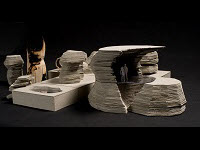Computational Design I (Fundamentals) - CODE1150
Description
Computational Design I (Fundamentals)’ is the first of three Computational Design courses that introduces students to Computational Design. Students are introduced to computational geometry and algebra in order to design and develop through Grasshopper 3D small objects and artifacts. Students will produce in this course innovative geometry that will shape the form, space and detail of architectural environments, produced via digital fabrication techniques 3D printing and laser cutting. To achieve this they will engage with cutting edge and developing digital modelling applications, techniques and cultures. The course will aim to develop your skills in using digital technology to experiment and generate creative architectonic geometries. A weekly lecture will develop themes relating to the culture and application of complex geometries and algebra within the digital or computational context, and propose conceptual challenges that drive the edges of our current understanding. Within the context of this course, modelling applications will be used as a medium for testing and manipulating digital forms. We will review the nature and scope of modelling concepts in a more general context, looking at its history, evolution, applications and potentiality as a design tool. Theoretical knowledge will be presented under some broad concepts: Topological Architectures, Influenced Architectures, Dynamics and Motion, Generative Forms, Parametric Design, Evolving Architectures, Digital Fabrication, Digital Manipulation, Digital Optimization and Performance. You will engage in weekly lab classes to experiment and develop with complex geometries. Assessment will be based on your progressive performance in the lab class, exams to assess online content (Grasshopper and Rhino) and a number of assessable tasks that will demonstrate the evolution of your explorations.









